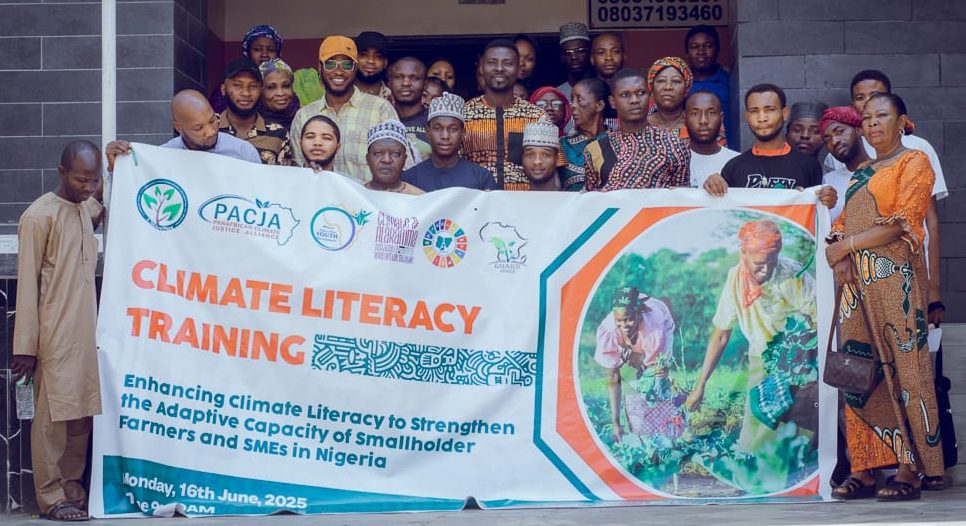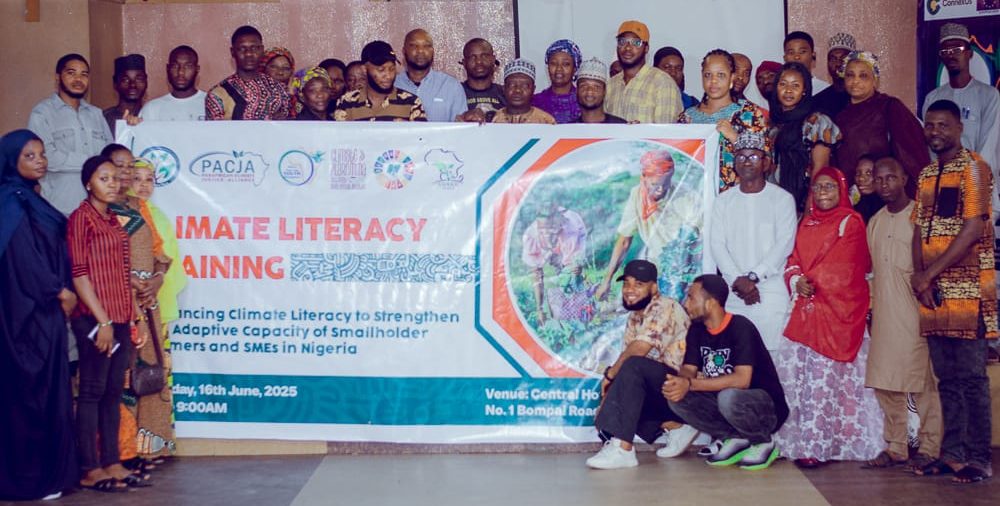
Report by: Paul Joseph Gwumapan
In a bid to bolster resilience against climate change and enhance food security, the Climate and Sustainable Development Network of Nigeria (CSDevNet), in collaboration with African Focus for Youth Development (AFFYD), conducted a transformative training program for smallholder farmers and Small and Medium Enterprises (SMEs) in Kano, Nigeria, on June 17, 2025.
Supported by the Pan African Climate Justice Alliance (PACJA), Climate Alaramma Sustainable Development Initiative, and Guard Africa, the initiative, themed “Enhancing Climate Literacy to Strengthen the Adaptive Capacity of Smallholder Farmers and SMEs in Nigeria,” aimed to equip participants with critical knowledge and tools to navigate the challenges of climate change.
CSDevNet’s National Coordinator, Mr. Steven Abu, emphasized the program’s core objectives during the training session. “
This initiative is designed to build resilience to climate change and enhance food security,” Abu stated.
He highlighted the importance of introducing SMEs and farmers to climate-smart agriculture practices, such as agroforestry and other sustainable farming methods, to help them adapt to the adverse impacts of climate change.

Abu also noted a significant gap in climate change knowledge among farmers and communities, underscoring the need for such training programs.
He urged participants to share their newfound knowledge with others in their communities to amplify the program’s impact.
Ibrahim Muhammad-Shamsudeen, Founder of Climate Alaramma Sustainable Development Initiative and Northwest Zonal Coordinator for CSDevNet, described the training as a vital step toward fostering climate-resilient communities in Nigeria.
He pointed out that the world is grappling with a triple planetary crisis—climate change, biodiversity loss, and pollution which disproportionately affects smallholder farmers and SMEs.
“Climate change directly impacts their livelihoods, often leading to post-harvest losses and reduced productivity,” Shamsudeen explained.

“This pushes vulnerable communities toward extreme poverty and food insecurity, which can exacerbate conflicts and drive migration.”
Shamsudeen called on the Nigerian government to prioritize the implementation of climate change policies to support smallholder farmers and SMEs.
“Across Africa, we have robust policies to address the climate crisis, but our challenge lies in effective implementation,” he said, stressing the need for actionable measures to combat food insecurity and bolster resilience.
The training received positive feedback from attendees, including Alhaji Danladi Bello from Yusuf Maitama Sule Federal University of Education, Kano. Bello praised the organizers for delivering practical insights into mitigating and adapting to climate change.
“This is the kind of knowledge local farmers need to manage their farms effectively,” he said, expressing enthusiasm for applying the lessons learned to support sustainable farming practices.
A Call for Collective Action
The Kano training underscores the critical role of climate literacy in empowering vulnerable communities to adapt to a changing environment.
By equipping smallholder farmers and SMEs with the tools to adopt sustainable practices, CSDevNet and its partners are paving the way for a more resilient and food-secure Nigeria.
As climate challenges intensify, initiatives like these highlight the importance of collaboration between NGOs, governments, and communities to translate policies into meaningful action.

